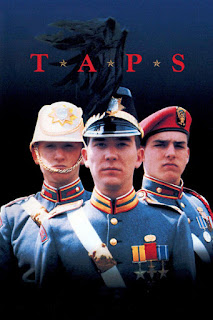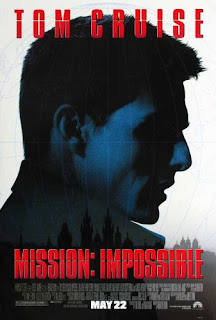Taps (1981)
The key to understanding Taps lies in its name. It differs from the title of the novel that serves as its source material, and perhaps for good reason: while both follow the general premise of a group of military cadets fighting to keep their school open, Devery Freeman's Father Sky serves as more of a psychological investigation behind the cadets' reasoning and their parents' opposition, while Taps purely focuses on the cadets. This may be a result of the fact that the film rights were purchased before Father Sky was published. However, nitpicking over similarities and differences doesn't mean too much when Taps provides a subdued analysis of its own on military culture within the United States.
Responses to this film have been mixed in their descriptions, with many describing it as an action or as a film ultimately sympathetic towards the goals of the cadets. However, these analyses contradict points made obvious within various scenes. To begin with, the conflict begins with the announcement that Bunker Hill Military Academy will be closing the next year in order to clear up space for future land development. General Bache, commandant of the academy, laments to protagonist Brian Moreland that the principles of the military and its place in society has decline in popularity with civilians, who prefer a life of commercialism and quiet living to the discipline and honor taught at Bunker Hill. Bache also tells Moreland that he believes a reasonable fight can be put up to save the school, so long as all the cadets stand together and hold their ground.
It's this scene that proves essential to the unfolding tragedy of the plot. The first major event is a scuffle between the cadets and civilian teenagers that results in the accidental death of one of the civilians after Bache's gun is fired. The shooting results in Bache suffering a heart attack and an order to immediately shut the school down. But Moreland, following the words of Bache, leads all the other cadets in an armed resistance to keep Bunker Hill open.
On first glance, it seems that Taps has provided reason to sympathize with the cadets and their goal. However, it's important to note that, at this point, there is already a clear division between the military and civilian life. It's not so much as the cadets defending themselves against an untrue allegation that Bache purposely killed a civilian, but rather that the civilians do not want them there any longer and are now actively threatened by their existence. This latter point grows stronger as the cadets are shown stocking up on weapons that were supposed to be confiscated following the shooting, resulting in jarring imagery like 12-year-old boys in control of massive and destructive weaponry.
As the conflict continues, negative reception to it grows. For instance, parents who sent their sons to the academy demand that they be released. Even members of the military get involved and threaten to invade the school in order to end the efforts of the cadets. There's a bitter sense of irony that comes with individuals who have flagrantly supported the US military in the past chastising the boys for doing what they have been taught to do. It only worsens as various boys within the school are killed throughout the conflict and have their deaths labeled as avoidable tragedies.
It's because of all this that I have a difficult time viewing Taps as anything but a condemnation of military culture. Given that the novel was published only four years after the end of the Vietnam War, watching young boys die for their own skewed sense of what's right while the rest of the world condemns them for it feels especially sobering and sarcastic. The cadets aren't responsible for the violence that occurred, but rather the larger part of American society, who evoke jingosim or do nothing but sit by idly and watch as unnecessary violence occurs. This latter case is particularly emphasized by the quiet way Taps is filmed. Nothing about it draws attention to any one particular thing, nor does it stress the violence or the emotions of the characters; rather, it plays out with all its brief but brutal events like a dry drama might play out, leaving the viewer more disconnected from the violence than a standard kind of war or action film, and perhaps condemning them as part of the larger problem. Thus, we get the title of our film: Taps, that quiet, somber melody played after the death of a soldier, and a tune that represents more in this film, like the death of innocence, or the death of military culture as the US once knew it.
While Endless Love is technically the film debut of Tom Cruise, Taps is the first time we see Cruise play a central character, and the first time we also see him play a character associated with the military. It's a bit funny, given that only five years later, he would be making blatant propaganda for the US Navy, but Cruise can best be described as completely apolitical with the scripts he chooses. As far as his performance goes, his character doesn't have much relevance until the very end of the movie, leaving the rest of his role somewhat forgettable. However, the intensity he carries through the film comes to a boiling point in a scene that occurs just moments before the end of the film and one that I've found very effective in the grander scheme of the narrative. It's his character, in my opinion, that helps cement the overall anti-military theme of the movie.
Taps is a great film to check out for anyone interested in anti-war films, particularly ones that choose a softer-spoken route. The approach this film takes understandably leaves some viewers feeling underwhelmed and even bored, but I definitely appreciated what this film has to offer the first and second time around.
Rating: 3.5/5 - January 14, 2020




Comments
Post a Comment